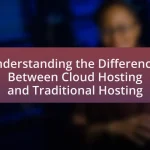Managed hosting significantly impacts SEO and online visibility by enhancing website performance, security, and support. Key benefits include faster loading times, improved uptime reliability, and robust security measures, all of which contribute to higher search engine rankings. The article explores how managed hosting influences critical performance metrics, the role of server location in SEO, and the importance of security for maintaining search engine visibility. Additionally, it addresses potential challenges associated with managed hosting, such as limited control over server configurations and vendor lock-in, while offering best practices for optimizing managed hosting setups to maximize SEO effectiveness.
What is the Impact of Managed Hosting on SEO and Online Visibility?
Managed hosting positively impacts SEO and online visibility by providing enhanced performance, security, and support. Faster loading times, a critical factor for search engine rankings, are achieved through optimized server configurations and resources dedicated to specific websites. Additionally, managed hosting often includes robust security measures, such as firewalls and regular updates, which protect websites from threats that could lead to downtime or data breaches, both of which negatively affect SEO. Furthermore, the technical support offered by managed hosting providers allows for quicker resolution of issues, ensuring minimal disruption to website availability. Studies have shown that websites with faster load times can see a significant increase in organic traffic, reinforcing the importance of managed hosting in improving SEO and online visibility.
How does managed hosting influence website performance?
Managed hosting significantly enhances website performance by providing dedicated resources, optimized server configurations, and expert support. This environment minimizes downtime and ensures faster load times, which are critical factors for user experience and search engine rankings. Research indicates that websites with load times under three seconds can achieve higher conversion rates, as users are less likely to abandon slow-loading sites. Additionally, managed hosting often includes performance monitoring and automatic updates, further contributing to consistent and reliable website functionality.
What specific performance metrics are affected by managed hosting?
Managed hosting specifically affects performance metrics such as website uptime, page load speed, server response time, and overall site reliability. These metrics are critical for user experience and directly influence SEO rankings. For instance, a study by Google indicates that a one-second delay in page load time can lead to a 20% decrease in conversions, highlighting the importance of managed hosting in optimizing load speeds. Additionally, managed hosting services often provide enhanced security measures, which can reduce downtime caused by attacks, thereby improving uptime metrics.
How does website speed impact SEO rankings?
Website speed significantly impacts SEO rankings, as search engines prioritize fast-loading sites in their algorithms. Google has confirmed that page speed is a ranking factor, with research indicating that a one-second delay in load time can lead to a 7% reduction in conversions. Additionally, studies show that 53% of mobile users abandon sites that take longer than three seconds to load. Therefore, optimizing website speed is crucial for improving search engine visibility and user experience.
What role does server location play in SEO?
Server location significantly influences SEO by affecting website loading speed and regional search rankings. Search engines prioritize fast-loading websites, and a server located closer to the target audience can reduce latency, leading to quicker page loads. Additionally, search engines like Google consider the geographical relevance of a server’s location when determining local search results. For instance, a study by Google indicated that a one-second delay in loading time can lead to a 20% decrease in traffic, underscoring the importance of server proximity for optimal performance and visibility in search results.
How does proximity to target audiences affect loading times?
Proximity to target audiences significantly affects loading times, as shorter distances between servers and users reduce latency. When content is hosted closer to the audience, data travels a shorter distance, resulting in faster loading speeds. Studies indicate that a one-second delay in loading time can lead to a 7% reduction in conversions, highlighting the importance of minimizing latency for user experience and engagement.
What are the implications of server location on local SEO?
Server location significantly impacts local SEO by influencing website loading speed and search engine rankings. When a server is geographically closer to the target audience, it typically results in faster load times, which is a critical ranking factor for search engines like Google. Research indicates that a one-second delay in page load time can lead to a 7% reduction in conversions, highlighting the importance of speed in user experience and SEO performance. Additionally, search engines often prioritize local results for users based on the server’s location, meaning that a website hosted on a server within the same region as its target audience is more likely to rank higher in local search results. This correlation between server location and local SEO effectiveness underscores the necessity for businesses to consider their hosting solutions in relation to their target market’s geographic area.
How does managed hosting enhance security for SEO?
Managed hosting enhances security for SEO by providing dedicated resources and expert management that protect websites from cyber threats. This type of hosting typically includes features such as firewalls, DDoS protection, and regular security updates, which help to prevent data breaches and downtime. For instance, a study by the Ponemon Institute found that the average cost of a data breach is $3.86 million, emphasizing the financial impact of security vulnerabilities. By ensuring a secure environment, managed hosting not only safeguards sensitive information but also maintains website uptime and performance, both of which are critical factors for search engine rankings.
What security features are typically included in managed hosting?
Managed hosting typically includes security features such as firewalls, DDoS protection, regular backups, malware scanning, and SSL certificates. These features work together to safeguard data and maintain website integrity. Firewalls monitor and control incoming and outgoing network traffic based on predetermined security rules, while DDoS protection helps mitigate distributed denial-of-service attacks that can disrupt service availability. Regular backups ensure data recovery in case of loss, and malware scanning identifies and removes harmful software. SSL certificates encrypt data transmitted between the server and users, enhancing security and boosting SEO rankings by signaling trustworthiness to search engines.
How does website security influence search engine rankings?
Website security significantly influences search engine rankings by affecting user trust and site performance. Search engines prioritize secure websites, particularly those using HTTPS, as they provide a safer browsing experience. According to Google, HTTPS is a ranking signal, meaning that secure sites are more likely to rank higher in search results compared to their non-secure counterparts. Additionally, security breaches can lead to downtime and loss of data, negatively impacting user experience and increasing bounce rates, which further harms rankings. Thus, maintaining robust website security is essential for optimizing search engine visibility.
What are the Benefits of Managed Hosting for SEO?
Managed hosting significantly enhances SEO performance by providing optimized server environments, improved site speed, and better uptime reliability. These factors contribute to higher search engine rankings, as search engines prioritize fast-loading and consistently available websites. For instance, Google has indicated that site speed is a ranking factor, and studies show that a one-second delay in page load time can lead to a 7% reduction in conversions. Additionally, managed hosting often includes expert support for SEO best practices, ensuring that technical aspects like site structure and security are properly managed, further boosting online visibility.
How does managed hosting improve uptime and reliability?
Managed hosting improves uptime and reliability by providing dedicated resources and expert management, which minimizes downtime and enhances performance. This type of hosting typically includes proactive monitoring, regular maintenance, and immediate technical support, ensuring that any issues are quickly addressed. For instance, managed hosting providers often implement redundant systems and failover solutions, which can reduce the risk of outages. According to a study by HostingAdvice, managed hosting services can achieve uptime rates of 99.99%, significantly higher than typical shared hosting solutions, which often experience more frequent downtimes. This increased reliability not only enhances user experience but also positively impacts SEO, as search engines favor websites that maintain consistent availability.
What is the relationship between uptime and search engine visibility?
Uptime directly influences search engine visibility, as search engines prioritize websites that are consistently accessible. High uptime rates ensure that a website is available for crawling and indexing, which is essential for maintaining or improving search rankings. According to a study by Moz, websites with higher uptime experience better organic traffic and visibility, as search engines like Google penalize sites that frequently go offline. Therefore, maintaining a high uptime is crucial for optimizing search engine visibility.
How can downtime negatively affect SEO performance?
Downtime can significantly harm SEO performance by causing search engines to be unable to access and index a website. When a website experiences downtime, it leads to a drop in crawl frequency, which can result in lower rankings in search engine results pages (SERPs). According to a study by Moz, websites that experience frequent downtime can see a decrease in organic traffic by up to 20% due to reduced visibility and indexing issues. Additionally, prolonged downtime can lead to increased bounce rates, as users are likely to leave a site that is unavailable, further signaling to search engines that the site may not be reliable.
What advantages does managed hosting offer for scalability?
Managed hosting provides significant advantages for scalability by offering dedicated resources and flexible infrastructure. This allows businesses to easily adjust their server capacity based on traffic demands, ensuring optimal performance during peak times. Managed hosting services often include automated scaling solutions, which can dynamically allocate resources without manual intervention, thus minimizing downtime and enhancing user experience. Additionally, providers typically offer load balancing and content delivery networks (CDNs) that further support scalability by distributing traffic efficiently across multiple servers. These features collectively enable businesses to grow without the constraints of traditional hosting environments, ensuring that their online presence remains robust and responsive as they expand.
How does scalability impact website traffic and SEO?
Scalability directly influences website traffic and SEO by ensuring that a website can handle increased visitor loads without performance degradation. When a website is scalable, it can accommodate spikes in traffic, such as during promotions or viral events, which helps maintain user experience and engagement. A positive user experience is crucial for SEO, as search engines prioritize sites that load quickly and function smoothly. According to Google, page speed is a ranking factor, and sites that fail to perform well under high traffic may experience higher bounce rates, negatively impacting their search rankings. Therefore, effective scalability not only supports higher traffic volumes but also enhances SEO performance by maintaining optimal site functionality.
What are the SEO benefits of handling traffic spikes effectively?
Handling traffic spikes effectively enhances SEO by maintaining website performance and user experience during high-traffic periods. When a website can manage increased visitor numbers without slowing down or crashing, it reduces bounce rates and improves user engagement, both of which are positive signals to search engines. For instance, Google considers page load speed and user experience as ranking factors; a site that remains responsive under heavy traffic is likely to rank higher in search results. Additionally, consistent uptime during traffic spikes helps build domain authority and trust, further benefiting SEO.
How does managed hosting facilitate better technical SEO?
Managed hosting facilitates better technical SEO by providing optimized server environments that enhance website performance and reliability. This type of hosting typically includes features such as faster loading times, improved uptime, and better security measures, all of which are critical factors for search engine rankings. For instance, Google considers page speed as a ranking factor, and managed hosting services often utilize content delivery networks (CDNs) and caching technologies to ensure quick load times. Additionally, managed hosting providers frequently offer regular updates and security patches, which help maintain site integrity and protect against vulnerabilities that could negatively impact SEO.
What technical SEO aspects are improved by managed hosting?
Managed hosting improves several technical SEO aspects, including website speed, uptime reliability, and security. Enhanced website speed is achieved through optimized server configurations and resources dedicated to specific sites, which can lead to faster loading times that positively impact search engine rankings. Uptime reliability is bolstered by robust infrastructure and support, ensuring that websites remain accessible, which is crucial for maintaining search visibility. Additionally, managed hosting often includes advanced security measures, such as firewalls and regular updates, which protect against vulnerabilities that could harm a site’s SEO performance. These improvements collectively contribute to a better user experience and higher search engine rankings.
How does managed hosting support mobile optimization?
Managed hosting supports mobile optimization by providing dedicated resources and configurations that enhance website performance on mobile devices. This type of hosting ensures faster loading times, which is crucial for mobile users, as studies show that a one-second delay in loading can lead to a 7% reduction in conversions. Additionally, managed hosting often includes features such as automatic scaling, which adjusts server resources based on traffic demands, ensuring that mobile users experience consistent performance even during peak times. Furthermore, managed hosting providers typically offer expert support for optimizing mobile-specific elements, such as responsive design and mobile-friendly content delivery, which are essential for improving user experience and search engine rankings.
What Challenges Might Arise with Managed Hosting and SEO?
Managed hosting can present several challenges for SEO, primarily due to potential limitations in server configuration and control. These limitations may restrict the ability to optimize server settings for speed and performance, which are critical factors for search engine rankings. Additionally, managed hosting providers may implement shared resources that can lead to slower load times during peak traffic, negatively impacting user experience and SEO performance. Furthermore, reliance on the hosting provider for updates and security can introduce risks if the provider does not adhere to best practices, potentially leading to downtime or vulnerabilities that search engines penalize.
What are the potential downsides of managed hosting for SEO?
Managed hosting can negatively impact SEO due to limited control over server configurations and potential shared resources. This lack of control may hinder the ability to optimize server settings for speed and performance, which are critical factors for search engine rankings. Additionally, if managed hosting involves shared environments, the performance of other sites on the same server can affect loading times and uptime, both of which are detrimental to SEO. Research indicates that page load speed is a ranking factor for Google, and slower sites can lead to higher bounce rates, further impacting visibility.
How can misconfigured managed hosting settings harm SEO?
Misconfigured managed hosting settings can harm SEO by causing website downtime, slow loading speeds, and improper indexing by search engines. Downtime can lead to a loss of traffic and negatively impact search engine rankings, as search engines may penalize sites that are frequently unavailable. Slow loading speeds can increase bounce rates, which signals to search engines that the site may not provide a good user experience, further harming rankings. Additionally, if settings prevent search engines from properly indexing the site, it can result in lower visibility in search results. Studies show that a one-second delay in page load time can lead to a 7% reduction in conversions, highlighting the importance of optimal hosting configurations for maintaining SEO performance.
What are the risks of vendor lock-in with managed hosting?
Vendor lock-in with managed hosting poses significant risks, primarily limiting flexibility and increasing costs. When businesses rely heavily on a specific provider’s infrastructure and services, migrating to another vendor becomes complex and expensive due to proprietary technologies and data formats. This dependency can hinder scalability, as companies may struggle to adapt to changing needs without incurring substantial fees or downtime. Additionally, vendor lock-in can lead to reduced bargaining power, as businesses may find themselves unable to negotiate better terms or services due to their reliance on a single provider. According to a study by the Cloud Industry Forum, 70% of organizations reported challenges in switching providers, highlighting the prevalence of these risks in managed hosting scenarios.
How can businesses mitigate risks associated with managed hosting?
Businesses can mitigate risks associated with managed hosting by implementing a comprehensive risk management strategy that includes regular security audits, robust data backup solutions, and clear service level agreements (SLAs). Regular security audits help identify vulnerabilities in the hosting environment, allowing businesses to address potential threats proactively. Robust data backup solutions ensure that critical data is preserved and can be restored quickly in case of data loss or breaches, minimizing downtime and impact on operations. Clear SLAs outline the responsibilities of the hosting provider, including uptime guarantees and support response times, which helps businesses set expectations and hold providers accountable. These measures collectively enhance the security and reliability of managed hosting services, thereby reducing associated risks.
What best practices should be followed when choosing a managed hosting provider?
When choosing a managed hosting provider, prioritize reliability, performance, and support. A reliable provider ensures minimal downtime, which is crucial for maintaining website visibility and SEO rankings. Performance metrics, such as server speed and load times, directly impact user experience and search engine rankings; thus, selecting a provider with optimized infrastructure is essential. Additionally, robust customer support is vital for resolving issues quickly, as prolonged outages can harm online visibility. According to a study by Google, a one-second delay in page load time can lead to a 20% drop in conversions, highlighting the importance of performance in managed hosting.
How can regular audits improve managed hosting effectiveness for SEO?
Regular audits can significantly enhance managed hosting effectiveness for SEO by identifying and resolving technical issues that may hinder website performance. These audits assess factors such as site speed, uptime, and security vulnerabilities, which are critical for search engine rankings. For instance, a study by Google indicates that page load time is a crucial ranking factor, with a delay of just one second potentially reducing conversions by 7%. By regularly auditing managed hosting environments, businesses can ensure optimal server configurations and resource allocation, leading to improved site performance and user experience, both of which are essential for better SEO outcomes.
What practical tips can enhance the impact of managed hosting on SEO?
To enhance the impact of managed hosting on SEO, prioritize server speed and uptime, as these factors significantly influence search engine rankings. Fast loading times improve user experience, which is a ranking factor for Google; for instance, a one-second delay in page load time can lead to a 7% reduction in conversions. Additionally, ensure that the managed hosting provider offers robust security features, such as SSL certificates and regular backups, which protect the website from threats and maintain its credibility, further supporting SEO efforts. Implementing a Content Delivery Network (CDN) through the managed hosting service can also improve site speed and accessibility for global users, positively affecting SEO performance.
How can businesses optimize their managed hosting setup for better SEO results?
Businesses can optimize their managed hosting setup for better SEO results by ensuring high uptime and fast loading speeds. High uptime, ideally above 99.9%, prevents website downtime, which can negatively impact search engine rankings. Fast loading speeds, ideally under three seconds, enhance user experience and reduce bounce rates, both of which are critical factors for SEO. Additionally, utilizing a Content Delivery Network (CDN) can further improve loading times by distributing content closer to users. Implementing SSL certificates enhances security, which is also a ranking factor for search engines. Regularly updating server software and optimizing server configurations can improve performance and security, contributing to better SEO outcomes.
What ongoing maintenance practices are essential for SEO success with managed hosting?
Ongoing maintenance practices essential for SEO success with managed hosting include regular performance monitoring, timely software updates, and consistent backup management. Performance monitoring ensures that website speed and uptime are optimized, which are critical factors for search engine rankings. Timely software updates, including content management systems and plugins, help prevent security vulnerabilities that could negatively impact SEO. Consistent backup management safeguards against data loss, ensuring that the website can be restored quickly in case of issues, thus maintaining its online visibility. These practices collectively contribute to a stable and secure hosting environment, which is vital for sustaining SEO efforts.










